Nobel Laureate and MIT economist Professor Daron Acemoglu returned to London Business School (LBS) on June 19th to present his vision for rebuilding liberalism in an era of technological change, economic uncertainty, and political fragmentation. The event was hosted by the Dean of London Business School, Sergei Guriev and moderated by Elias Papaioannou, Professor of Economics at London Business School and Academic Co-Director of the Wheeler Institute for Business and Development. Acemoglu’s lecture addressed key questions around the role of business, governance and policy in promoting inclusive and sustainable growth. A recording of this event is available in this blog and on the Wheeler Institute YouTube channel here.
The event, attended by students, faculty, and members of the public, provided a preview of Acemoglu’s forthcoming book titled Remaking Liberalism: The Past, Present, and Future of Freedom and reflected his ongoing collaboration with LBS, where he holds an honorary doctorate and has previously taught in the doctoral programme.
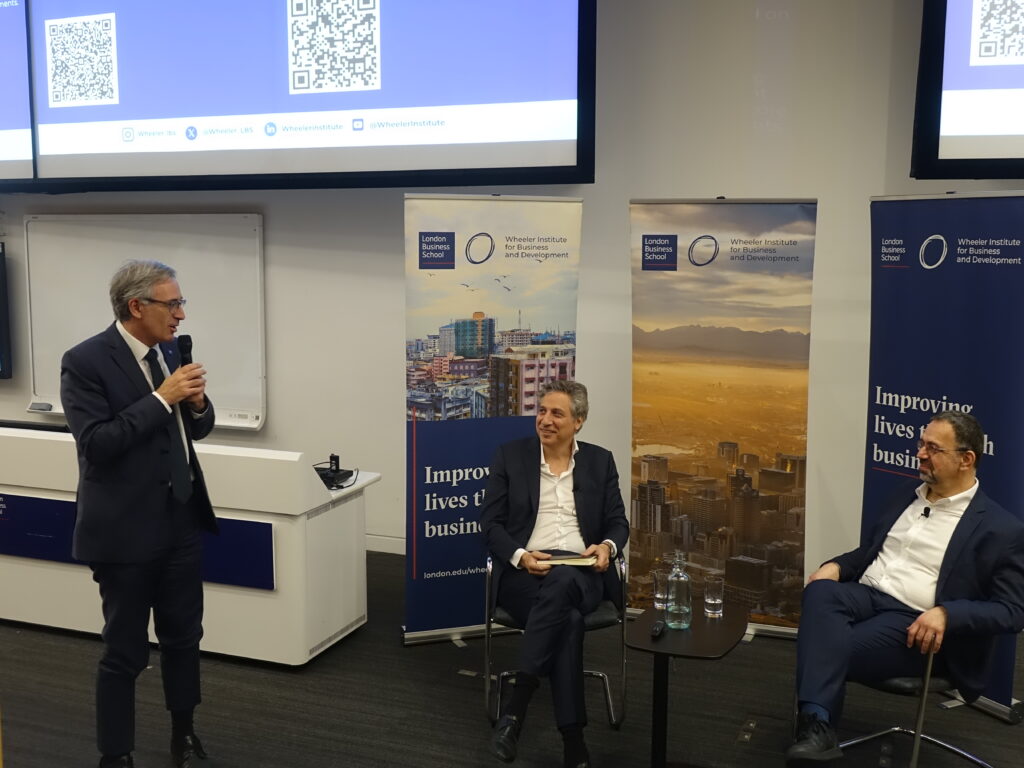
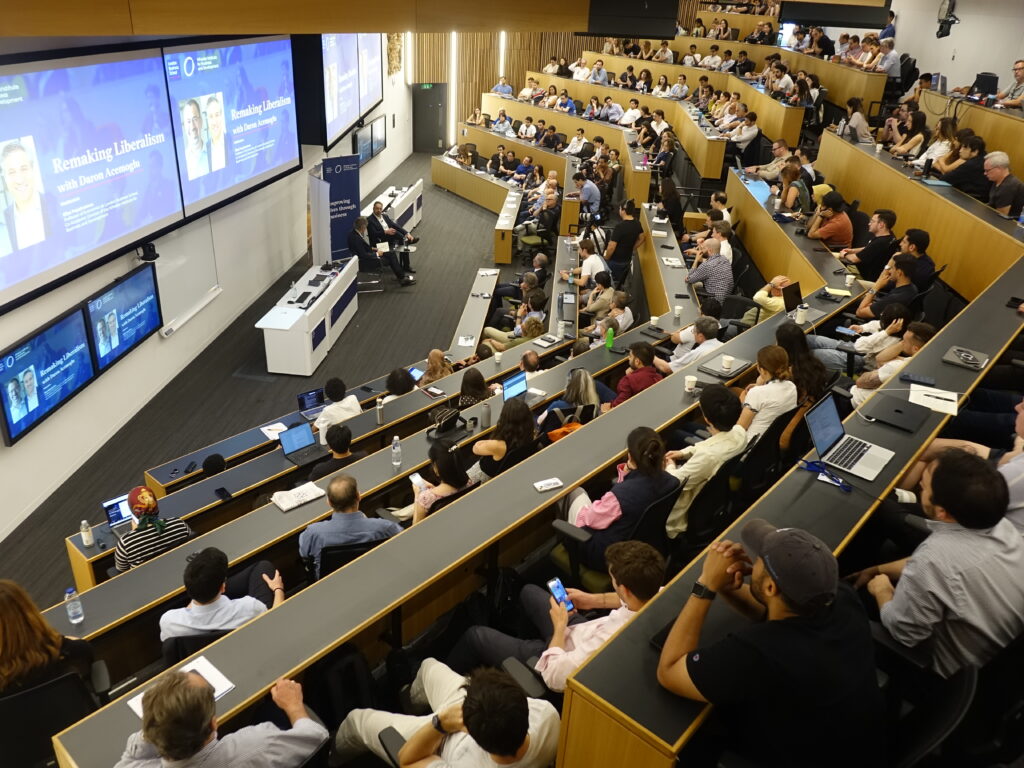
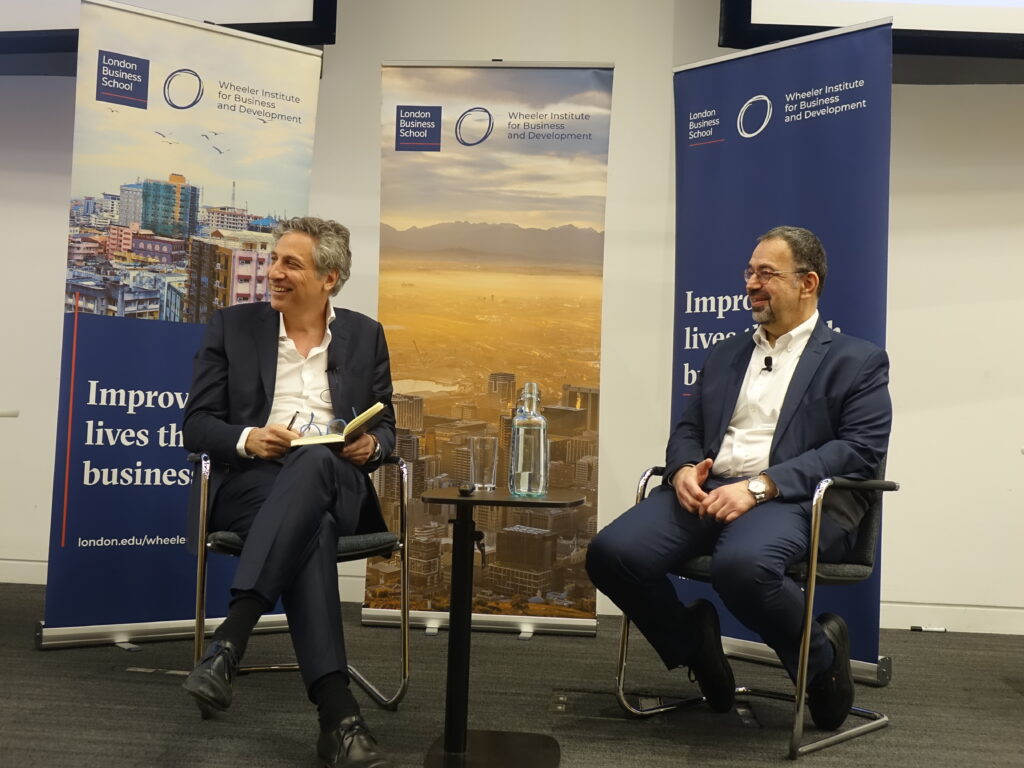
Liberalism: A Tradition Under Strain
Acemoglu opened by acknowledging that liberalism, understood as both a political philosophy and an institutional framework, has delivered extraordinary progress over the past 150 years. He noted its historic contributions to individual rights, economic growth, the rule of law, and the expansion of public services.
However, he argued that the liberal tradition has not kept pace with contemporary realities. “Liberalism was more effective in opposition than it has been in power,” Acemoglu explained. Despite maintaining influence within global institutions and public discourse, modern liberal politics has struggled in many countries to deliver shared prosperity or social cohesion.
This has contributed to a growing perception among working-class communities that liberalism no longer reflects or serves their interests. In countries such as the United Kingdom and the United States, trust in democratic institutions and liberal values has eroded, with many citizens expressing frustration at their perceived lack of voice in policymaking.
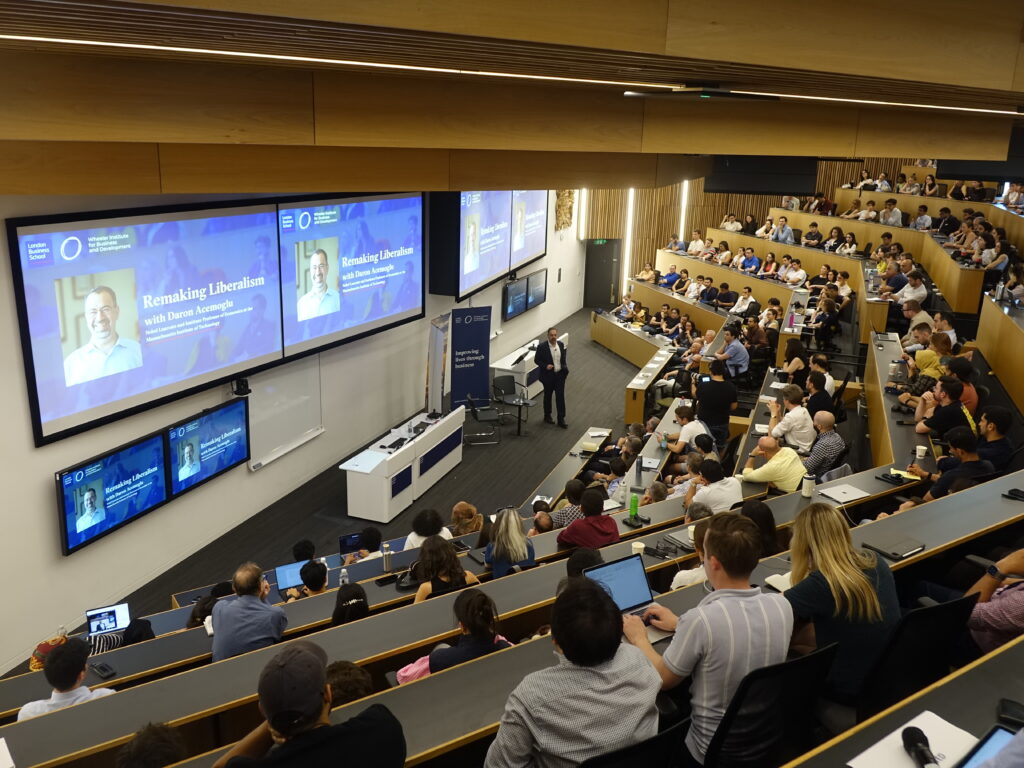
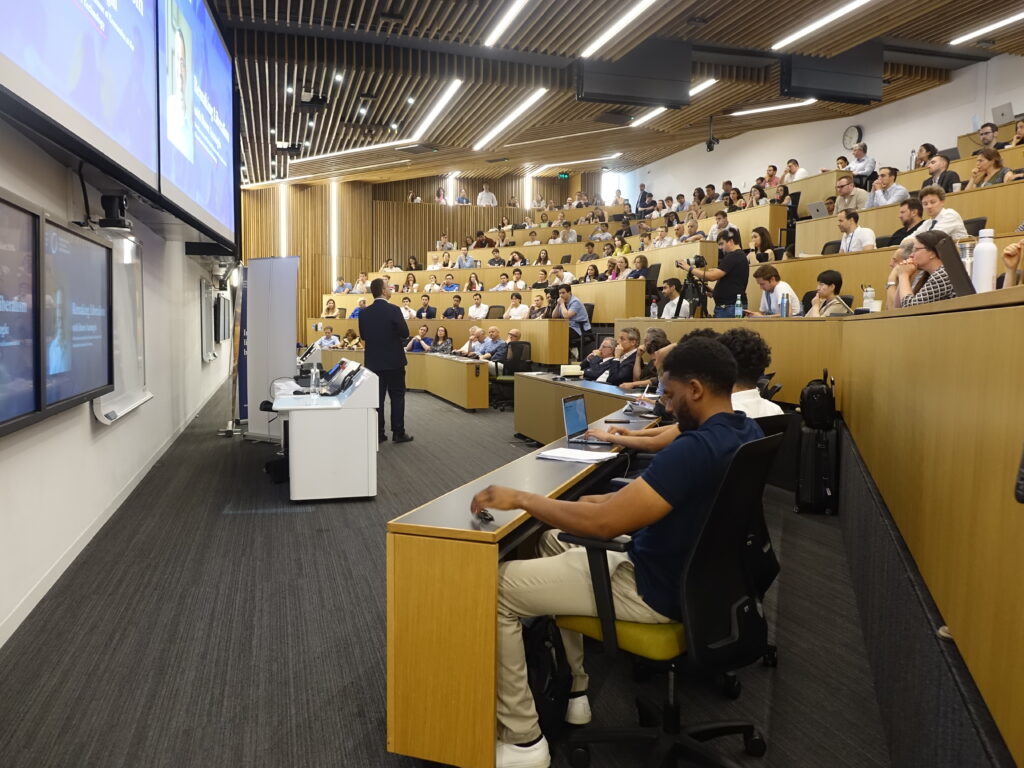
From the Era of Inclusive Economic to Post – Industrial Political Divides
Acemoglu traced liberalism’s current challenges to what he called the “breakdown of the industrial compact”- the post-war model in which firms, workers and democratic governments were aligned around a shared economic vision. During this period, companies invested in labour, wages rose in line with productivity, and public services expanded to meet the needs of increasingly urbanised populations.
Today, that compact has eroded. The rise of digital technology, automation and global value chains has made it possible for firms to grow without hiring more workers. New technologies, he said, have disproportionately rewarded the college-educated and high-skilled, while offering fewer opportunities to those in routine or manual occupations. The result has been both widening inequality and political polarisation. Acemoglu also noted that the decline of local political participation and decision-making has reduced communities’ ability to influence their own economic direction, further weakening an important pillar of democratic liberalism.
Acemoglu also pointed to the rise of what he termed “post-industrial politics” – a political environment shaped less by class and more by educational and cultural divides. Across many advanced economies, traditional centre-left parties have become more aligned with urban, university educated voters, while lower income and lower educated groups have shifted toward populist or conservative alternatives.
This shift, he argued, has complicated efforts to address inequality. While educated liberal voters tend to favour redistribution through taxation, many working-class voters prefer job creation, labour protections and public investment which are approaches that have not always been prioritised by mainstream parties.
The Role of Technology and Business
Technology was a recurring theme throughout the lecture. Acemoglu warned that current trajectories in artificial intelligence (AI) and automation risk deepening existing inequalities unless they are actively shaped by public policy and business leadership.
“Efficiency should not mean replacing workers at every opportunity,” he said. Instead, he called for investment in “pro-worker AI”, more precisely technologies that complement human skills and create new employment opportunities across a wide range of sectors, including care work, education, and community services. Acemoglu was clear that these shifts will not happen on their own. They will require a rethinking of how innovation is financed and regulated. Business leaders, investors, and educational institutions will need to play a central role in ensuring that new technologies promote opportunity and social mobility.
In response to a question about Elon Musk’s vision of a fully automated future supported by universal basic income, Acemoglu argued that such approaches neglect the importance of dignity, social contribution, and the value of meaningful work. “A society where half the population is economically inactive is not a desirable outcome,” he said.
Three Pillars:
Drawing directly from his book Remaking Liberalism,in the final section of his talk, Acemoglu set out a framework that can restore legitimacy and relevance to liberal institutions in today’s world. He outlined three key pillars:
- Shared prosperity through inclusive innovation
A renewed focus on economic growth must be aligned with broad-based job creation. This involves steering innovation toward technologies that amplify rather than replace human effort, particularly in sectors with rising demand such as healthcare, education and green infrastructure.
- Community and self-government
Acemoglu argued that effective democracy requires not only elections but also active local participation. Rebuilding trust in liberal institutions will require strengthening communities’ ability to make meaningful decisions about their economic and social futures.
- Pluralism with respect for difference
While liberal societies must protect individual rights, Acemoglu stressed the importance of recognising cultural and social diversity. Policies that accommodate different community values, while ensuring safeguarding of fundamental freedoms, can help rebuild solidarity and democratic engagement.
He acknowledged that this agenda involves trade-offs and may look different across countries and contexts. However, he emphasised that liberalism’s historical strength has been its ability to evolve in response to social and economic challenges.
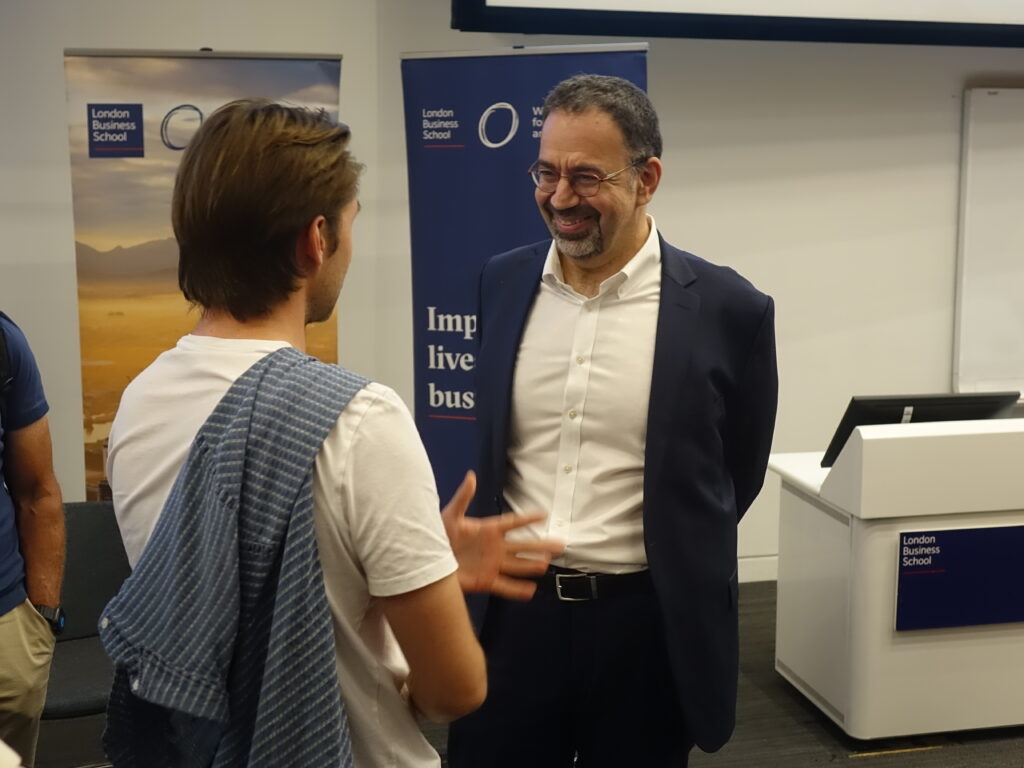
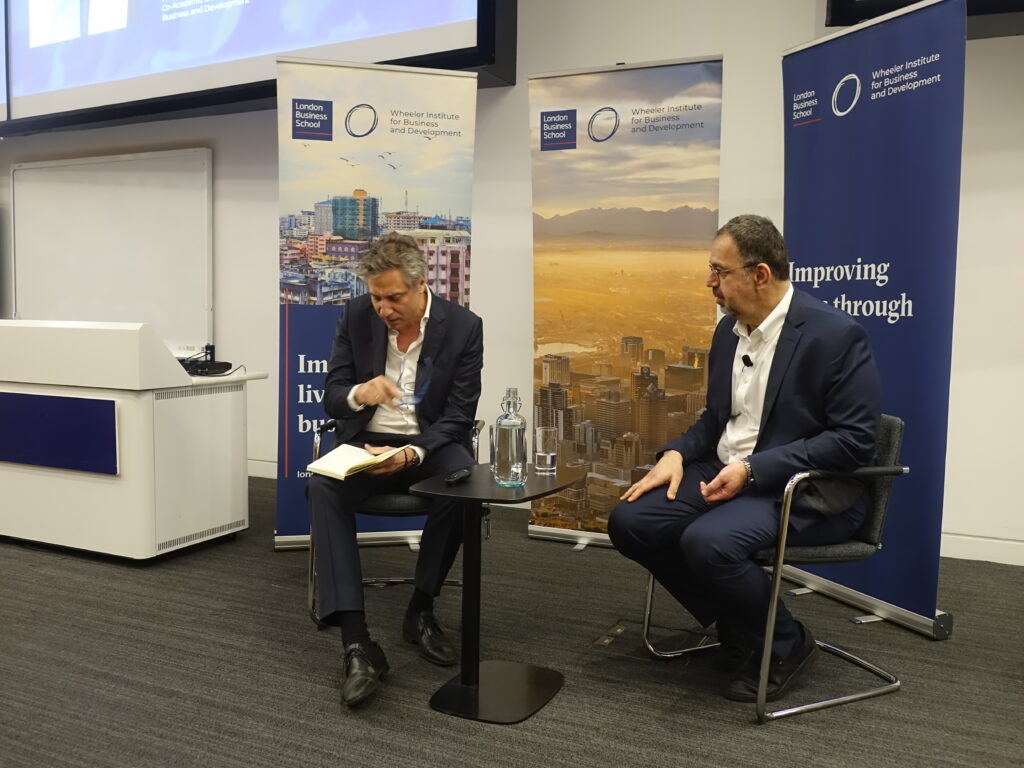
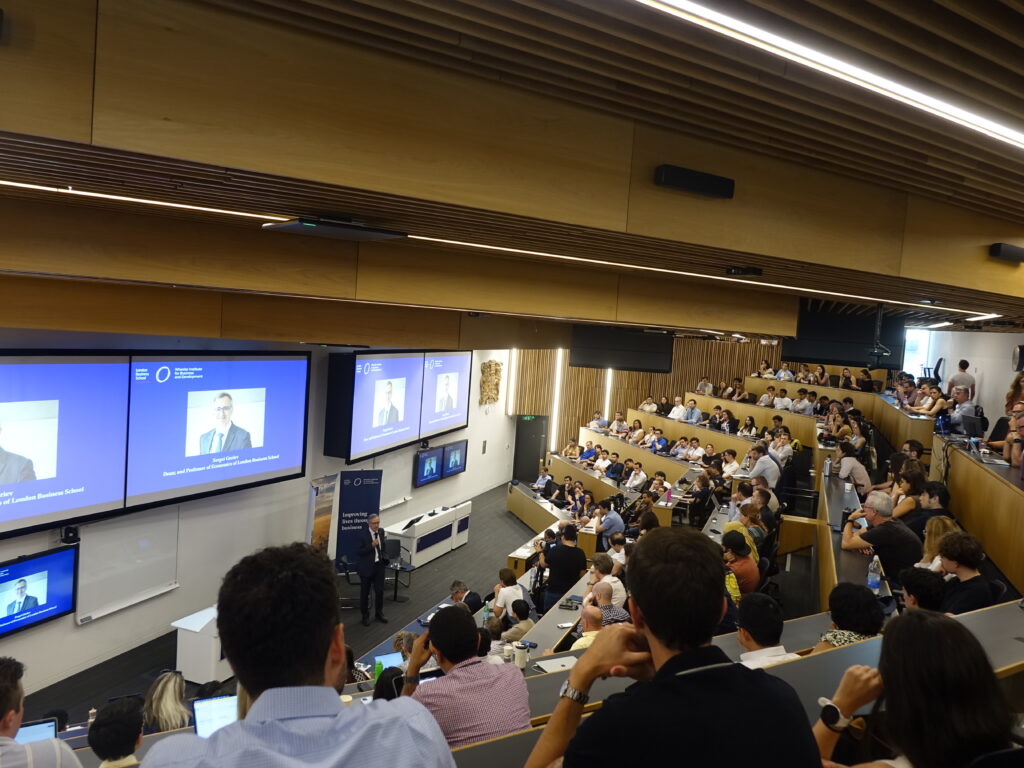
Reflections and Response
The lecture was followed by a conversation moderated by Elias Papaioannou. He began by reflecting on how liberalism is defined today, contrasting philosophical descriptions with the realities of contemporary governance. Picking up on themes from the lecture, he questioned whether modern liberal institutions had become overly focused on economic models and market efficiency than on the values, identities and concerns of the wider public.
The discussion addressed the growing disconnect between liberal institutions and the communities they aim to serve. Despite widening inequality and reduced social mobility, there appears to be limited appetite for large-scale redistribution which raises questions about whether people have lost faith in the state’s capacity to deliver meaningful change.
Acemoglu was also asked to reflect on how certain ideas, especially particularly those favoured by globalised, educated elites, have come to dominate political discourse in recent decades, and whether this has contributed to the backlash against liberal norms. He noted that this narrowing of perspective has left liberalism vulnerable to challenge, especially from movements that promise to restore voice, status and identity to those who feel left behind.
The discussion closed with reflections on the emotional dimensions of political discontent. Beyond economic exclusion, many citizens feel culturally and socially disconnected from the institutions that govern them. For liberalism to be renewed, Acemoglu argued, it must offer not only material opportunity but also a genuine sense of belonging and influence. These themes resonated in the wide range of audience questions, which touched on topics such as the risks of AI consolidation, the future of education, and the challenges of regional inequality. In response, Acemoglu offered a call to action: “The future of liberal democracy depends on our ability to generate not just ideas, but institutions that work for a broader segment of society.”
Implications for Policy and Practice
Acemoglu’s lecture offered a powerful reminder that economic and political systems don’t always manage to self-correct. As global societies confront the pressures of technological disruption and democratic disaffection, there is a growing need for institutions that can adapt, listen and deliver. For policymakers, the challenge lies in re-aligning policy tools with contemporary realities. For businesses and business schools, the message was clear: the choices made today in terms of innovation, employment, and leadership will shape not only the economy, but the future of democratic governance.
This event was supported by the Sui Foundation.
About the speaker
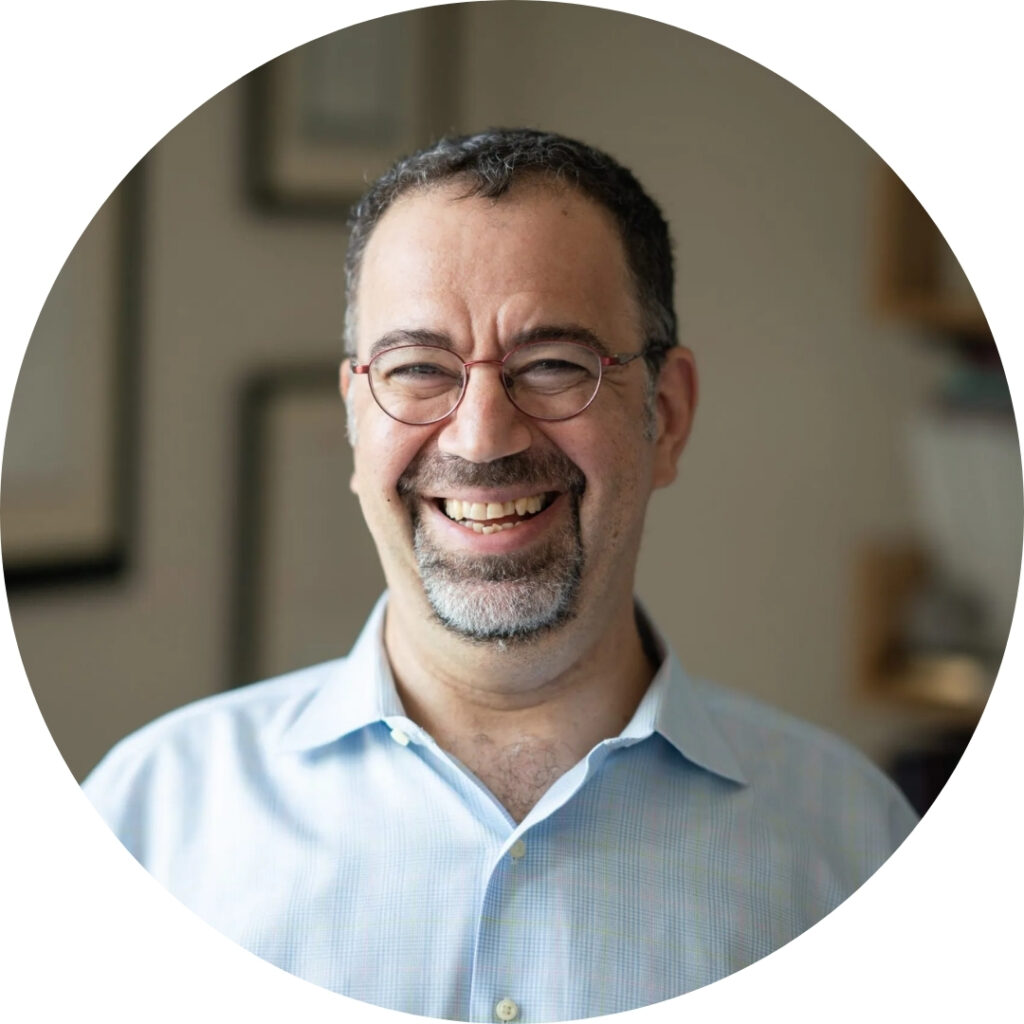
Daron Acemoglu is an Institute Professor at MIT, Faculty Co-Director of the James M. and Cathleen D. Stone Center on Inequality and Shaping the Future of Work, and a Research Affiliate at MIT’s newly established Blueprint Labs. He is an elected fellow of the National Academy of Sciences, American Philosophical Society, the British Academy of Sciences, the Turkish Academy of Sciences, the American Academy of Arts and Sciences, the Econometric Society, the European Economic Association, and the Society of Labor Economists. In 2024, Acemoglu, jointly with James A. Robinson and Simon Johnson, were awarded the Nobel Memorial Prize in Economic Sciences for their comparative studies in prosperity among nations. Daron holds Honorary Doctorates from many Universities including London Business School.

Elias Papaioannou is a Professor of Economics at London Business School, where he co-Academic Director of the Wheeler Institute for Business and Development. His research focuses on international finance, political economy, economic history, growth, and development, with work published in leading journals such as Econometrica, Review of Economic Studies, Quarterly Journal of Economics, Journal of Political Economy, American Economic Review, and Journal of Finance. He is also a CEPR Research Fellow and serves as Managing Co-Editor of the Review of Economic Studies. In the 2019/2020 academic year, Elias held the Varian Visiting Professorship of Economics at the MIT Department of Economics.
About the writer

Gabriela Tomova (MIF 2025) is a Masters in Finance student at London Business School. Prior to the MiF, she completed her undergraduate studies in Economics at Erasmus University and worked at the London office of JPMorgan in product development with a focus on fintech and technology in capital markets. Gabriela is an intern for the Wheeler Institute, contributing to the creation of content that amplifies the role of business in improving lives.
